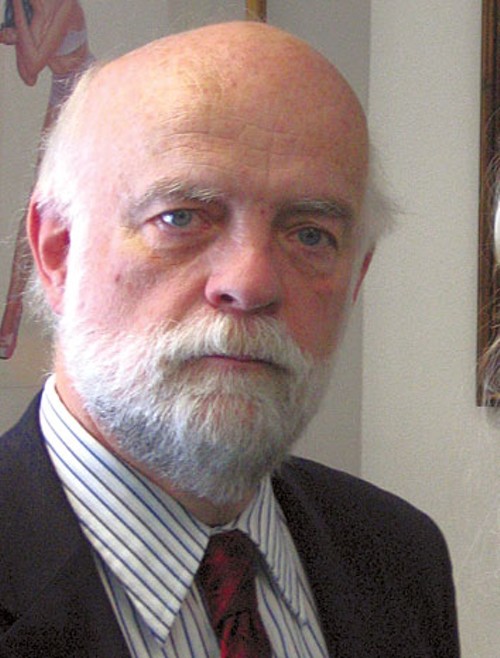An Innocent Man
Harry Miller tries to reclaim his life after spending years in prison for a crime he says he didn’t commit.
By Stephen Dark @stephenpdarkPage 4 of 4
JUMPING ON THE BANDWAGON
After he was released, Miller wanted only to return to Louisiana. But first he sought to clear his name. Attorney Andrew McCullough took Miller’s case pro-bono, impassioned by what he saw as the injustice of the case. Through attorney friends, McCullough raised the bus fare so his client could return home. When Miller left Utah, “it felt damned good.”
In a matter of days after the innocence statute became law in April 2008, McCullough quickly filed Utah’s first innocence petition. Then-assistant-attorneys-general Erin Riley and Matthew Bates “came after us with both feet and both fists,” McCullough says. The AG’s Scott Reed says the petition—rather than providing evidence Miller was innocent—simply stated his innocence as a fact. “I can tell you 4,000 guys in Draper that would say ‘Hey, I’m innocent, too. Trust me on this,’ ” Reed says.
In a memorandum, the state claimed, “there is no compelling interest of justice that requires that a factual innocence hearing now be granted to petitioner in this case.” That statement, McCullough argued in court filings, “conveys total indifference as to whether an innocent man has been unjustly punished, and punished severely.”
In a ruling McCullough described as “chilling,” Judge McCleve granted the state’s motion to dismiss Miller’s petition. McCleve wrote contradictorily that, “Although the [new] evidence makes it unlikely that Petitioner committed the crime,” her court had already reviewed the evidence and determined it wouldn’t have changed the result of the trial.
In 2009, Miller, after working for a time at a Donaldsonville fried-chicken restaurant, took a bus back to Utah. After he cashed a Social Security check for $2,000 and rented a South Salt Lake apartment with a girlfriend, she accused him of hitting and choking her. They sought protective orders against each other, and he pleaded guilty to a misdemeanor assault charge in exchange for probation. “Maybe I’m just not supposed to be in Utah,” he says. Sentenced to 90 days in jail, with credit for time served, he was released. He later took a reduced guilty plea for an attempted drug-possession charge. McCullough is appealing both convictions.
After McCleve dismissed the innocence case, McCullough appealed her decision, with the Rocky Mountain Innocence Center providing assistance a year later in the form of an amicus brief. On Feb. 4, 2010, the appeals court ruled on Miller’s challenge to McCleve’s decision.
The court said that Miller’s petition raised “a justiciable bona fide issue of factual innocence,” namely that “Miller’s commission of the underlying offense, although not impossible, is highly debatable because of both physical and temporal limitations.” Not only did the stroke limit his movement, but he only had 24 hours to “fly from his recovery bed in Louisiana to Utah in order to commit an act of physical violence against a complete stranger.”
Miller, the court concluded in what Reed labeled “a fairly tortured reading of the statute,” nevertheless, “may receive the factual-innocence hearing to which he is statutorily entitled.”
WILL THIS NEVER END?
After the appeal court’s decision, McCullough handed over the case to the Rocky Mountain Innocence Center, which has the resources to develop the evidence the attorney general needed to declare Miller an innocent man. In mid-March 2011, RMIC’s Jensie Anderson gave assistant attorney general Scott Reed what she says amounts to the “full story” of how Miller came to be wrongly convicted. Along with securing affidavits from residents of Donaldsonville providing a detailed timeline of Miller’s movements, which, Anderson believes, puts Miller “definitely there the whole time,” RMIC has also highlighted questions surrounding the eyewitness identification. Other evidence Anderson and her students have marshaled for the attorney general include a witness saying she saw Smart’s attacker running from the scene of the crime and then jump a 6-foot-high fence—an impossible feat for Miller post-stroke.
While Brandon Smart remains convinced Miller committed both his wife’s assault and the Dee’s robbery, as Julia Smart talks over her memories of living with the assault, the trial, then finding out through a news story that Miller had been released, her anger focuses on the state of Utah. “There’s definitely some injustice going on in the Utah state government, obviously on both sides,” she says. If Miller wants to continue fighting, “more power to him.”
She did what she felt was right. “I’m pretty much over it, I don’t want to have to deal with it.” She admits, however, she is angry that “the state believed him over me. I was right there in front of him.” She expresses concern over people’s perception of her testimony. “What character does that leave me with?”
National eyewitness expert Wells feels bad for Julia. “She was clearly victimized originally; now she’s in this never-ending saga where, in a sense, she was victimized again, by this mistaken-identification problem. Now she’s got to live with that.” The public will look at what she did, he argues, leaving her to ask herself, he continues, “ ‘Will this never end?’ ”
Reed believes that, “unless there is shattering evidence that implicates Mr. Miller,” the case will be wrapped up before the end of the year. Anderson says that hopefully with the additional alibi evidence and “new” evidence she and her team have gathered, “the AG will stipulate to Harry’s innocence without an evidentiary hearing.” Reed says he wants to check through the evidence. “Right now, we are in the ‘trust-but-verify’ mode,” he says, paraphrasing a quote from former President Ronald Reagan.
That doesn’t cut much slack with former Miller attorney Kent Hart. Look at the timeline, he says. Miller was wrongfully convicted in 2003. Now, at the end of 2011, if the state concurs, Utah will finally acknowledge a mistake was made. “The bottom line is everyone knows Harry Miller is innocent. So, we have to verify for eight years?”
As much as the restitution money would allow Miller to finally buy a home in the Louisiana countryside, away from the city, where he could drink beer on his front porch in the cool of the evening, what he most wants is an apology from Julia Smart and the state of Utah. An apology from Smart seems unlikely. As to the state, Reed says, “If the evidence is there to support [Miller’s innocence], then I will be the first to go to the Legislature and the governor and say this man is factually innocent.”
Miller, with his raspy laughter and his sadness, lives with the knowledge that if he had not had a stroke, he might well still be in prison. He says his bid for an innocence declaration “is about trying to open that door to live again.” Some nights, he lies in bed, thinking about his life “and cries like a baby. Sometimes you can’t help the way life be treating you.”
« previous 1 2 3 4
More by Stephen Dark
-
Call it a Comeback
Long mired in economic depression, Midvale’s Main Street dusts off its small-town charm.
- Sep 20, 2017
-
Love Letters
Correspondence between a young woman at the Topaz internment camp and her beloved sheds light on Trump's America.
- Sep 6, 2017
-
Triggered
Veterans Affairs exists to help vets. So why did the Salt Lake VA appoint an anti-veteran chief?
- Aug 30, 2017
- More »
Latest in Cover Story
Readers also liked…
-
Forget the family pedigree—Robert F. Kennedy Jr should not be the next president of the United States
Trojan Horse
- Jun 21, 2023
-
Women decry harassment and toxic culture at St. George auto dealership
Men at Work
- Oct 11, 2023






